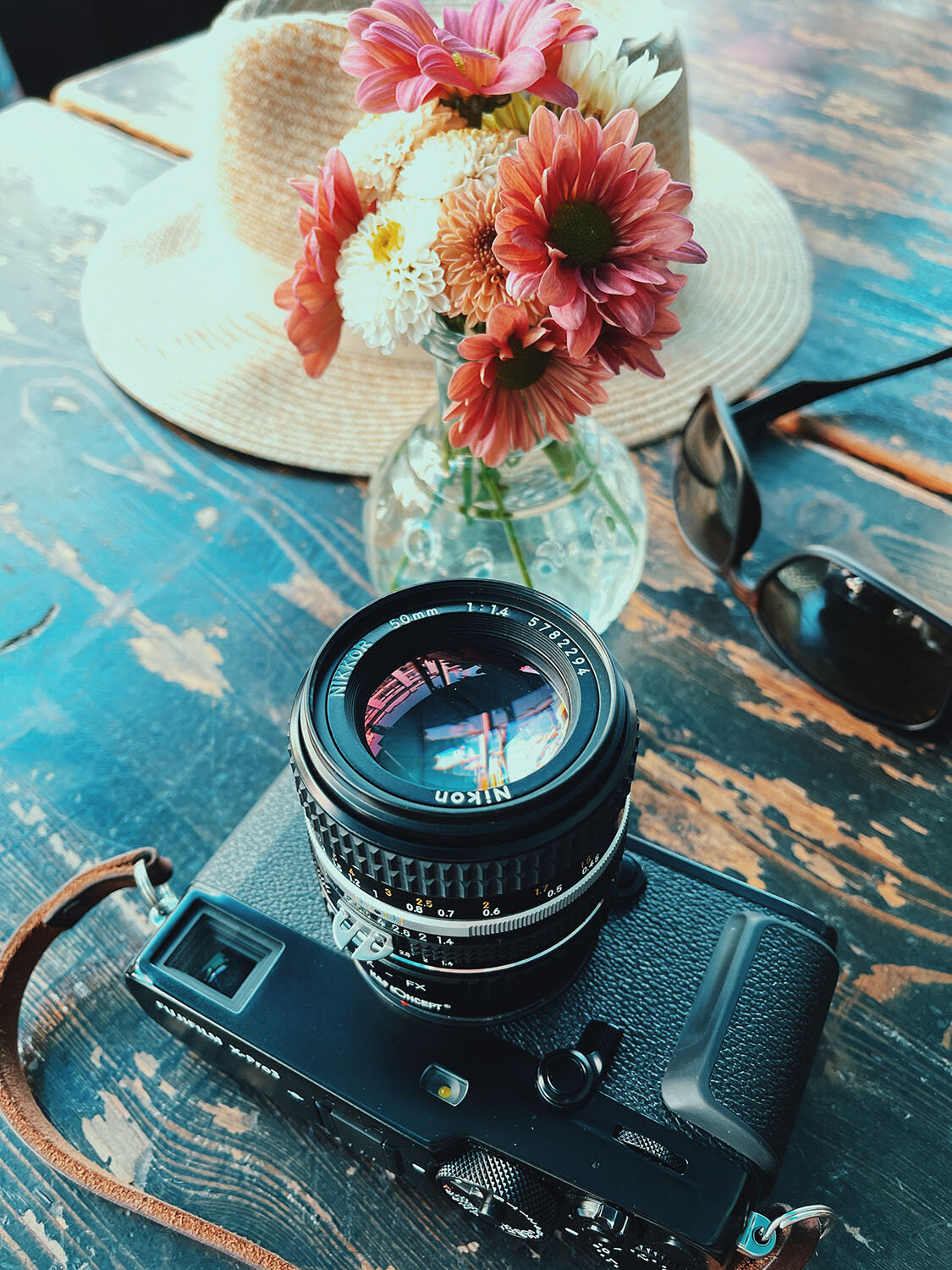Nikkor 50mm f/1.4 AI-S on Fujifilm X Series

The Nikkor 50mm f/1.4 AI-S mounted on a Fujifilm X-Pro3 with a K&F Concept NIK to FX adapter
Nikkor 50mm f/1.4 AI-S on the Fujifilm X-Pro3
Nikkor 50mm f/1.4 AI-S Review
Back in February, I wrote an article about five different 50mm lens options for the Fujifilm X mount. It is interesting how I still do not consider 50mm one of my go-to focal lengths on APS-C and yet I keep coming across interesting options to review.
After testing quite a few wide-angle lenses lately it was refreshing to mount the Nikkor 50mm f/1.4 AI-S on my Fujifilm X-Pro3 and I headed out in the heatwave we are currently experiencing here in British Columbia.
The Nikkor 50mm f/1.4 AI-S mounted on a Fujifilm X-Pro3 with a K&F Concept NIK to FX adapter
Buying a Second Hand Nikkor 50mm f/1.4 AI-S
The Nikkor 50mm f/1.4 AI-S dates back to 1981 and can still be purchased new to this day for $469.95 which I believe is quite unprecedented. I found mine on the local used market for $120.00. Add to this an adapter for $30.00 and you are good to go. I picked the K&F Concept and bought it on Amazon.
I have now used the K&F Concept adapter with three different Nikon lenses and it works great.
Update: February 2024
The Nikkor 50mm f/1.4 is no longer available to purchase new.
The Nikkor 50mm f/1.4 AI-S is mounted on a Fujifilm X-Pro3 with a K&F Concept NIK to FX adapter. The beer may make manual focusing slightly harder depending on the level of intake.
Nikkor 50mm f/1.4 AI-S Specs and Handling
The Nikkor 50mm f/1.4 AI-S is an all-metal construction lens with an aperture ring, adjustable in full stops. It has the most wonderful manual focusing ring with rubberized grooves for an excellent grip with very smooth dampening.
The lens has 7 elements in 6 groups with 7 diaphragm blades. The filter diameter is 52mm and the minimum focusing distance is 45 cm.
I mainly purchased the Nikkor 50mm f/1.4 AI-S for my Nikon FM2n but why not take it for a spin on the Fujifilm X-Pro3 mirrorless camera to see how it fares on the digital X-Trans IV sensor?
Third Beach, Vancouver, Fujifilm X-Pro3, Nikkor 50mm f/1.4 AI-S
On the APS-C sensor, the Nikkor 50mm yields a 76.5mm equivalent field of view in full-frame terms. On my kitchen scale, it weighs in at 12.5 oz, 355 g, including the adapter, and combined with the X-Pro3 it is a hefty combination that feels solid in the hand. I use a vented third-party vented hood with this lens.
With the K&F Concept adapter, the focusing ring is pushed out on the lens barrel a bit but I find the distance very good and you still have a good camera/lens balance when focusing.
Third Beach, Vancouver, Fujifilm X-Pro3, Nikkor 50mm f/1.4 AI-S
How To Focus With the Nikkor 50mm f/1.4 AI-S on a Fujifilm X Camera
The Fujifilm X Series cameras have several modes aiding you in getting accurate focus. You can have a split B/W, split with a color, prism, and a variety of focus peaking modes with or without color. I suggest you try them all out to find your favorite. I have found the STD MF assist works best for me using the EVF (electronic viewfinder).
As you stop the lens down, you will notice the viewfinder getting darker and darker and manual focusing becomes harder because of it. If you shoot in either program or aperture priority mode, the other disadvantage is the fact that while your viewfinder gets darker your exposure doesn’t.
This may lead you to overexposure images unintentionally. You can alleviate this by keeping a close eye on your histogram in the EVF to ensure correct exposure. This has worked well for me.
To gain proper focus I often have my lens wide open or at f/2 and then quickly stop the lens down for added depth of field which can be helpful if your manual focusing is not spot on. Many of the sample images in this review are shot at f/2.8 or f/4 and fewer at f/2 or f/1.4.
Oldsmobile, Vancouver, Fujifilm X-Pro3, Nikkor 50mm f/1.4 AI-S
Nikkor 50mm f/1.4 AI-S Image Quality
With the Nikkor 50mm f/1.4 AI-S, I prefer images that are stopped down by one or two stops, meaning from f/2 or f/2.8 onwards.
The Nikkor 50mm f/1.4 AI-S produces excellent and sharp images with a classic signature and pleasing bokeh. Chromatic aberration is apparent at f/1.4 and I suspect adapting the lens makes the performance wide open slightly worse than you would see on a film camera.
I also had plenty of light on these gorgeous summer days for this test and wasn’t chasing the wide-open look.
The combination of an old lens such as the Nikkor 50mm f/1.4 AI-S with Fujifilm film simulations forms a wonderful symbiotic relationship and the experience and output become very film-like. More so than with newer lenses which may create a clinically more correct image.
The Nikkor 50mm f/1.4 AI-S mounted on a Fujifilm X-Pro3 with a K&F Concept NIK to FX adapter
Final Thoughts
As mentioned above I mainly got the Nikkor 50mm f/1.4 AI-S for my film cameras but it has surprised me positively on the X-Pro3, mostly due to a combination of great handling and classic-looking photos which are sharp and very usable.
It takes practice nailing the focus but I had way more keepers than photos out of focus. The super-smooth focus ring and aperture ring make for a tactile and very hands-on approach that I have come to appreciate.
Trying a lens such as the Nikkor 50mm f/1.4 AI-S can be an inexpensive way for you to explore a new focal length and the bonus is the fact that it is a pretty cool lens to add to a Nikon SLR film camera or one of the many digital Nikon SLRs.
Please see more sample images below
I have more sample images from the Nikkor 50mm f/1.4 AI-S in my review of the Nikon FM2n, FM3a, F3, and F3 HP which you can find here:
Nikon FM2n - Review
Nikon FM3a - Review
Nikon F3 - Review
Nikon F3 HP - Review
Update: April 2023
I decided to revisit the Nikkor 50mm f/1.4 AI-S and took it for a spin again with my X-Pro1 and X-Pro2. You can read more about it here:
Manual Focus and the Nikkor 50mm f/1.4 AI-S
Update: February 2024
I have now had a chance to test the Nikkor 50mm f/1.4 AI-S on a Nikon Zf and you can read more here:
Nikkor 50mm f/1.4 AIS - Sample Images
Please see the sample images below. Editing was done in Capture One and I used Fujifilm film simulations for some of the photos, especially Classic Neg. and Acros.
Please click to view larger images.
Dodge Van, Vancouver, Fujifilm X-Pro3, Nikkor 50mm f/1.4 AI-S
Coal Harbour, Vancouver, Fujifilm X-Pro3, Nikkor 50mm f/1.4 AI-S
Lionsgate Bridge, Vancouver, Fujifilm X-Pro3, Nikkor 50mm f/1.4 AI-S
Coal Harbour, Vancouver, Fujifilm X-Pro3, Nikkor 50mm f/1.4 AI-S
Coal Harbour, Vancouver, Fujifilm X-Pro3, Nikkor 50mm f/1.4 AI-S
Third Beach, Vancouver, Fujifilm X-Pro3, Nikkor 50mm f/1.4 AI-S
Third Beach, Vancouver, Fujifilm X-Pro3, Nikkor 50mm f/1.4 AI-S
Third Beach, Vancouver, Fujifilm X-Pro3, Nikkor 50mm f/1.4 AI-S
Denman Street, Vancouver, Fujifilm X-Pro3, Nikkor 50mm f/1.4 AI-S
English Bay Beach, Vancouver, Fujifilm X-Pro3, Nikkor 50mm f/1.4 AI-S
English Bay Beach, Vancouver, Fujifilm X-Pro3, Nikkor 50mm f/1.4 AI-S
English Bay, Vancouver, Fujifilm X-Pro3, Nikkor 50mm f/1.4 AI-S
Burrard Bridge, Vancouver, Fujifilm X-Pro3, Nikkor 50mm f/1.4 AI-S
West 4th Ave., Vancouver, Fujifilm X-Pro3, Nikkor 50mm f/1.4 AI-S
Downtown, Vancouver, Fujifilm X-Pro3, Nikkor 50mm f/1.4 AI-S
Robson Square, Vancouver, Fujifilm X-Pro3, Nikkor 50mm f/1.4 AI-S
Yaletown, Vancouver, Fujifilm X-Pro3, Nikkor 50mm f/1.4 AI-S
Sunset Beach, Vancouver, Fujifilm X-Pro3, Nikkor 50mm f/1.4 AI-S
Sunset Beach, Vancouver, Fujifilm X-Pro3, Nikkor 50mm f/1.4 AI-S
Sunset Beach, Vancouver, Fujifilm X-Pro3, Nikkor 50mm f/1.4 AI-S
English Bay Beach, Vancouver, Fujifilm X-Pro3, Nikkor 50mm f/1.4 A-IS
SLR Lenses for Fujifilm X Mount
Canon New FD 35mm f/2
Canon New FD 50mm f/1.4
Voigtländer Ultron 40mm f/2 SL IIs
Voigtländer Nokton 55mm f/1.2 SL IIs
Five 50mm Lenses for Fujifilm X Mount
See all of my reviews at a glance: Camera Reviews - Archives
